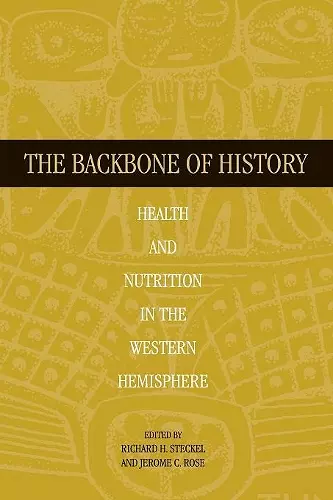The Backbone of History
Health and Nutrition in the Western Hemisphere
Richard H Steckel editor Jerome C Rose editor
Format:Paperback
Publisher:Cambridge University Press
Published:21st Mar '05
Currently unavailable, and unfortunately no date known when it will be back
This paperback is available in another edition too:
- Hardback£130.00(9780521801676)

An assessment of skeletal evidence on health indicators, to assess chronic conditions that affected Western populations.
This book gathers skeletal evidence on seven basic health indicators, to assess chronic conditions that affected the populations of the West over the past several millennia. As measured by childhood indicators of health, Native Americans were among the healthiest and the least healthy peoples in the Western Hemisphere pre-twentieth century.For the same reasons that explorers of the early twentieth century strove to reach the poles, and their modern counterparts journey to outer space, most people want to visualize the contours of the human experience - the peaks of adaptive success that led to the expansion of civilization, and the troughs in which human presence ebbed. The Backbone of History defines the emerging field of macrobioarchaeology by gathering skeletal evidence on seven basic indicators of health to assess chronic conditions that affected individuals who lived in the Western Hemisphere from 5000 BC to the late nineteenth century. Signs of biological stress in childhood and of degeneration in joints and in teeth increased in the several millennia before the arrival of Columbus as populations moved into less healthy ecological environments. Thus, pre-Colombian Native Americans were among the healthiest and the least healthy groups to live in the Western Hemisphere before the twentieth century.
'In this pathbreaking volume … more than 50 scholars (mostly anthropologists) systematically assess the health of North, South, and Central Americans using skeletal remains dating from over 7,000 years ago to the early 20th century. … Highly recommended.' Choice
'… this is a significant book that will define the emerging field of macrobioarchaeology for years to come. As such, it is required reading for all scholars interested in the study of long-term trends in human health, not only in the Americas but in the rest of the world as well.' American Historical Review
'The volume's contributions to knowledge are wide-ranging and significant.' Economic History
'With this important volume, based on several years of collaborative effort, Steckel and Rose have made a major contribution to the comparative study of human health and nutrition in the Americas.' Journal of Interdisciplinary History
'In this pathbreaking volume, the product of a massive NSF-funded project, more than 50 scholars (mostly anthropologists) systematically assess the health of North, South, and Central Americans using skeletal remains dating from over 7,000 years ago to the early 20th century. … Highly recommended.' Choice
'As befits the 20-year Herculean effort that went into this project, its scale and purpose are large. Based on the largest skeletal dataset ever assembled, it aims to assess how human health and well-being have changed in Europe over the last two millennia. To achieve this ambitious aim, a large transatlantic network of collaborators has been established … The book was edited by four renowned senior scholars in the field, whose experience and overview of the field are reflected in key chapters … how inspiring the whole project is …' Kaspar Staub, EH.Net
ISBN: 9780521617444
Dimensions: 233mm x 153mm x 37mm
Weight: 890g
654 pages